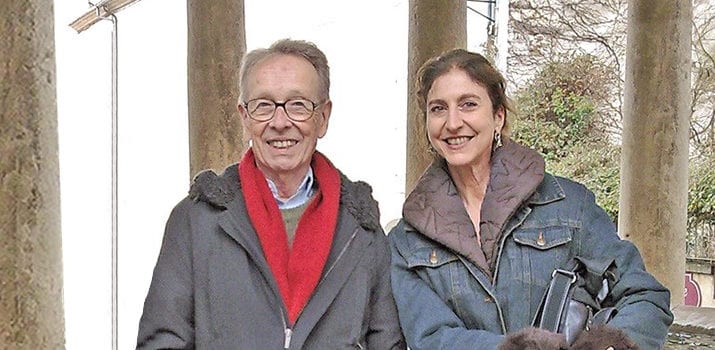Tribute to Philippe Jaccottet


Philipe Jaccottet and José-Flore Tappy in Grignan, 2012
photo: Christophe Gallaz
“Approaching death, one should be able to lean against it to see only the living.”
La Semaison, 1991
An international poet, translator and literary critic, Philippe Jaccottet, along with Rousseau, Ramuz and Cendrars, is one of only four Swiss authors to have been published in the “Bibliothèque de la Pléiade”, and one of the very few to have done so in his lifetime. We spoke to José-Flore Tappy, researcher and poet, who edited Philippe Jaccottet’s works for the Pléiade.
Your life paths are undeniably linked. What is your first memory of Philippe Jaccottet?
The discovery of the collection Airs, in 1970, when I was in high school – then the reading of Paysages avec figures absentes, two books that revolutionized poetry as we knew it from school. Suddenly, an author was speaking to us in close proximity, without any height, almost like a confidant, starting from the visible and without any preliminary ideas. Jaccottet looks before he thinks, then moves back and forth between his reflections – most often interrogative – and the attentive description of what surrounds him. Above all: the gaze, and the landscape, the concrete world; an intimate contact with reality in what it has to tell us.
At the end of 2020, Philippe Jaccottet decided to donate his manuscripts to the BCUL. How important were his archives to him?
In fact, of minimal importance. But all the same… It’s worth remembering that it was on the initiative of Jean-Pierre Clavel, then director of the Bibliothèque cantonale et universitaire de Lausanne, that Jaccottet agreed to deposit his first manuscript, Leçons (Payot, 1969), with the Bibliothèque in 1969. This first gesture was followed by the regular delivery of all his manuscripts over time, under the aegis of J.-P. Clavel, with his great literary sensitivity, and then of his successor Hubert Villard.
Jaccottet never paid much attention to his own work once the book was published. He didn’t care about keeping his papers. But he also respected the interest of researchers, insofar as they wouldn’t make a mockery of drafts, drafts, notes taken from day to day. He detested this interest in the smallest scrap of paper, where the academic researcher exploits the unpublished for the sake of valorizing his work. In fact, there’s no point in searching his archives for the keys to his work. His manuscripts are only of interest retrospectively, to support reading intuitions, refine observations, illustrate the validity of certain perceptions suggested by the texts themselves.
You’ve seen Philippe Jaccottet at work, and accompanied him in the publication of the latest volumes to come out under his name. What was it about his way of working that stood out?
He gropes, vacillates, hesitates, dares an image then withdraws it, formulates a question without answering it, weighs up the pros and cons… The poet is not someone who asserts, chaining together finds, metaphors, to serve beauty… he advances cautiously, without certainties, making this uncertain quest the very subject of his books. And it’s worth noting that a poet of his stature devotes himself to many activities other than poetry… that’s food for thought.
Three new books have just been released. Can you give us a sneak preview?
Three books, and three very different styles of writing… poems, prose and texts on art. Here we have three aspects of the author that have become inseparable over time: commentary, verse and prose. As the years went by, Jaccottet’s genres began to interact, sometimes in the same book, closely blending observations, reflections and readings. The last text, La Clarté Notre-Dame, in prose, gives voice to a man at a loss when faced with the imminence of his death, and who confronts this deadline with total lucidity. The text is striking for its extreme clarity, a clarity that is sometimes twilight but never confused or approximate. The author looks life in the face, the violence of the world, unbearable, but also his moments of dazzlement, those that have carried him through existence.
Over the years, the Manuscript Department of the Bibliothèque cantonale et universitaire – Lausanne has completed its collection of Philippe Jaccottet’s manuscripts, which was augmented by a generous donation from the author himself at the end of 2020.
You can borrow books by Philippe Jaccottet through Renouvaud or find a selection on eLectures.